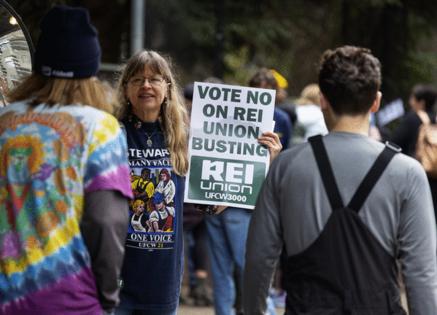REI members block leadership picks to guide struggling co-op's future
Published in Business News
SEATTLE — Three candidates for REI's board of directors were rejected by voting members, a win for a union that launched a campaign against the picks two months ago.
Two of the candidates were up for reelection, with their terms expiring this year. The other open spot was a point of contention for the REI union, which represents workers at 11 stores. Before the two-month election opened in early March, the union claimed REI had blocked candidates endorsed by the union and favored more corporate picks.
The union's message to members was to vote "withhold." If the candidates didn't receive a simple majority of votes in their favor, the spots would remain vacant.
"These nominees will not be appointed to the open seats," the co-op's board Chair Chris Carr said in a statement. "Per our bylaws, these three seats will remain vacant until filled by the board of directors."
Carr called the results disappointing. On Thursday, when REI announced the results of the election along with the co-op's financial results from 2024, CEO Mary Beth Laughton said the results are a big opportunity to listen to employees and members.
The two incumbent candidates were Liz Huebner, a former chief financial officer for Getty Images, and Michael McAfee, the CEO of PolicyLink, a national research institute.
The candidate for the open seat was Monica Schwartz, an executive vice president and chief digital officer of BJ's Wholesale Club.
The remaining board members are Carr, a former chief operations officer of salad chain Sweetgreen; Edward Philip, a member of the United Airlines board; Karen Glover, a corporate lawyer and member of the United Way Worldwide board; Patricia Lopez, former CEO of Highridge Brands; Doug Mack, former CEO of Fanatics; and Sharon Philpott, who works in public accounting.
Laughton is also on the board because of her role in the company.
The union backed two candidates, Tefere Gebre and Shemona Moreno. Gebre is a chief program officer of Greenpeace USA and Moreno is the executive director of climate group 350 Seattle.
"Even though REI kept my name off this year's ballot, today's results are what my candidacy was all about," Gebre said in a statement. "I ran for the Board because I wanted to advocate for greater transparency and democracy."
Joe Mizrahi, the secretary-treasurer for UFCW 3000, the union representing REI employees in Bellingham, said the results felt like a full-throated rebuke of the board and a show of solidarity with the fledgling union.
"I was simultaneously shocked and unsurprised," he said. "Not surprised the sentiment was there, but it's always shocking when you can send that huge of a message to an entity like REI."
Somewhat echoing Laughton's statement, Mizrahi said he hopes REI views this as a positive as well and a way to reset the relationship between the co-op and its employees.
Laughton took over the top role from former CEO Eric Artz REI on March 31.
She's leading REI at something of a crossroads. The company's financial results were red in 2022, posting $164 million in net loss even with a record $3.85 billion in revenue for the year. The red got worse in 2023 with $311 million in net loss.
For the third straight year, REI posted a loss in 2024. With $3.5 billion in revenue, the co-op reported a loss of $156 million
But the company says it's in a good position for a profitable future. Laughton said in an interview with The Seattle Times that REI's cash flow is near a break-even point.
"I think we have this foundation now to build off of," she said. "What I'm going to be focused on is ensuring we're making smart choices for the long-term health of the co-op and of the business, because we do need to drive growth and profits so so that we can invest back into our employees and members."
REI faces the same headwinds affecting the broader outdoor retail industry.
Consumer demand has waned from the early pandemic years when shoppers pumped money into outdoor apparel companies. Fickle winters can hurt winter shopping seasons. A new looming threat is President Donald Trump's tariffs announced in April, which could put a strain on an industry dependent on goods sourced from other countries.
Laughton also acknowledged there's been a disconnect between the co-op and its members. Her plan to return to REI's roots has so far been focused on seeking out and listening to member feedback.
The co-op also recently received backlash for signing on to a letter that endorsed Trump's pick for secretary of the interior, former North Dakota Gov. Doug Burgum.
The letter, from a roundtable of recreational companies and organizations, said Burgum's "support for outdoor recreation, the outdoor recreation economy, and the protection of public lands and waters," was in the roundtable's best interest.
Burgum quickly became controversial after he took office on Feb. 1. He's called for restoring the coal industry, ramping up natural resource extraction on untouched land in Alaska and building housing on federal lands.
In April, REI and Laughton addressed the letter, retracted the endorsement and apologized. She also noted that it had been signed before she took the CEO job.
Laughton told The Times that Trump administration aspirations to sell public lands sparked the apology.
"The endorsement was at odds with our values," she said. "We had to do the right thing to stay true to who we are."
©2025 The Seattle Times. Visit seattletimes.com. Distributed by Tribune Content Agency, LLC.












Comments